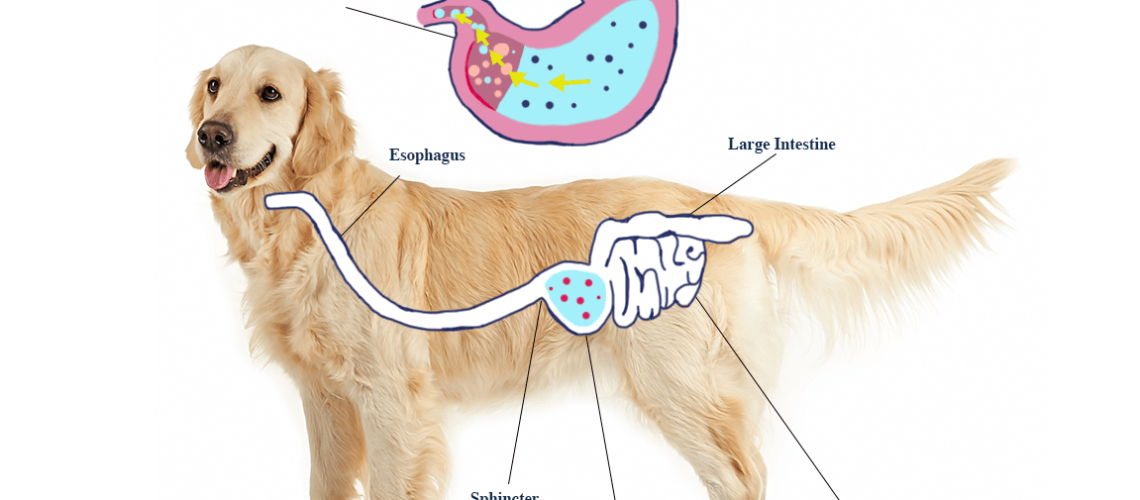Key Takeaways:
- Acid reflux in dogs is a common condition that occurs when stomach acid flows back into the esophagus.
- Common symptoms of acid reflux in dogs include regurgitation, vomiting, and discomfort after eating.
- Dietary changes, such as feeding smaller meals more frequently and avoiding certain foods, can help manage acid reflux in dogs.
- Elevating the dog's food and water bowls can also reduce symptoms by preventing the backflow of stomach acid.
- If acid reflux persists or worsens, it is important to consult a veterinarian for proper diagnosis and treatment options.
Are you a dog lover? If so, then understanding the topic of acid reflux in dogs is essential for you. Acid reflux is not just a human condition; it can also affect our furry friends. By delving into this subject, you will gain valuable knowledge that can help you provide better care for your beloved pet. Did you know that up to 60% of dogs experience acid reflux at some point in their lives? This means that it's more common than you might think. So, whether you're a seasoned dog owner or just starting out, learning about acid reflux in dogs is crucial for ensuring their health and well-being. Get ready to uncover the secrets behind this ailment and discover practical tips to manage it effectively. Let's dive in and give your four-legged friend the best life possible!
Understanding Acid Reflux in Dogs and Its Effects
What is Acid Reflux?
Acid reflux, also known as gastroesophageal reflux disease (GERD), is a condition that occurs when the stomach acid flows back up into the esophagus. This can happen in dogs just like it does in humans. The esophagus is the tube that connects the mouth to the stomach, and when the stomach acid enters it, it can cause irritation and discomfort.
The Effects of Acid Reflux on Dogs
When a dog has acid reflux, it can lead to various symptoms and health issues. The stomach acid irritates the lining of the esophagus, causing inflammation and discomfort. Some common effects of acid reflux in dogs include:
- Regurgitation: This is when food or liquid comes back up from the stomach into the mouth.
- Vomiting: Dogs with severe acid reflux may vomit frequently.
- Bad breath: The stomach acid can cause bad breath in dogs.
- Weight loss: If a dog's acid reflux is severe and they are unable to keep food down, they may experience weight loss over time.
It's important to recognize these symptoms and seek veterinary help if you suspect your dog has acid reflux. With proper diagnosis and treatment, you can help your furry friend feel better.
Recognizing Common Symptoms of Acid Reflux in Dogs
Signs Your Dog May Have Acid Reflux
As a responsible pet owner, it's crucial to be aware of the signs that indicate your dog may have acid reflux. Some common symptoms include:
- Excessive burping or belching
- Coughing or gagging after eating
- Loss of appetite or reluctance to eat
- Swallowing difficulties or discomfort while swallowing
- Excessive salivation or drooling
- Licking their lips frequently
If you notice any of these symptoms in your dog, it's essential to consult with a veterinarian. They can perform a thorough examination and determine if acid reflux is the underlying cause. Early detection and treatment can help alleviate your dog's discomfort and prevent further complications.
Diagnosing Acid Reflux in Dogs: How Veterinarians Can Help
Veterinary Examination for Acid Reflux
When you suspect that your dog may have acid reflux, it's crucial to seek professional help from a veterinarian. The vet will conduct a comprehensive examination to diagnose the condition accurately. They may perform the following:
- Physical examination: The vet will examine your dog's overall health and look for any signs of discomfort or inflammation.
- Medical history review: You'll be asked about your dog's eating habits, symptoms, and any changes in behavior or appetite.
- Diagnostic tests: To confirm the diagnosis, the vet may recommend X-rays, endoscopy, or pH monitoring to assess the severity of acid reflux and rule out other possible causes.
Based on the findings, the veterinarian will provide an accurate diagnosis and develop a treatment plan tailored to your dog's specific needs. It's important to follow their guidance closely for effective management of acid reflux in dogs.
Dietary Changes to Manage Acid Reflux in Dogs
Importance of Diet for Dogs with Acid Reflux
Diet plays a crucial role in managing acid reflux in dogs. Making appropriate dietary changes can help reduce symptoms and prevent flare-ups. Here are some dietary recommendations for dogs with acid reflux:
- Smaller meals: Instead of feeding large meals, divide your dog's daily food into smaller portions throughout the day. This helps prevent overeating and reduces the amount of stomach acid produced.
- Low-fat diet: High-fat foods can worsen acid reflux symptoms. Opt for a low-fat diet that includes lean proteins and easily digestible carbohydrates.
- Avoid trigger foods: Certain foods can trigger acid reflux in dogs. Common culprits include spicy foods, fatty meats, citrus fruits, and tomatoes. Avoid feeding these to your dog.
- Elevated feeding position: Feeding your dog from an elevated position can help prevent stomach acid from flowing back into the esophagus. Consider using a raised feeding bowl or placing their food on an elevated surface.
Remember to consult with your veterinarian before making any significant dietary changes for your dog. They can provide personalized recommendations based on your dog's specific needs and health condition.
Treating Acid Reflux in Dogs with Medication: Common Options
Medications for Managing Acid Reflux in Dogs
In addition to dietary changes, veterinarians may prescribe medications to help manage acid reflux in dogs. Some common medications used include:
- Antacids: These medications neutralize stomach acid and provide temporary relief from symptoms.
- Proton pump inhibitors (PPIs): PPIs reduce the production of stomach acid, helping alleviate symptoms and promote healing of the esophagus.
- H2 blockers: These medications decrease the amount of acid produced by the stomach, providing relief from acid reflux symptoms.
It's important to follow the veterinarian's instructions regarding medication dosage and administration. Regular check-ups with the vet will ensure that the prescribed medications are effective and appropriate for your dog's condition.
Lifestyle Modifications and Home Remedies for Alleviating Dog's Acid Reflux Symptoms
Lifestyle Changes to Manage Acid Reflux
Alongside dietary changes and medication, certain lifestyle modifications can help alleviate your dog's acid reflux symptoms. Here are some tips you can try at home:
- Weight management: If your dog is overweight or obese, helping them achieve a healthy weight can reduce the severity of acid reflux symptoms.
- Stress reduction: Stress and anxiety can worsen acid reflux. Create a calm and peaceful environment for your dog, providing plenty of exercise and mental stimulation.
- Slow feeding: Encourage your dog to eat slowly by using puzzle feeders or spreading their food out on a flat surface. This helps prevent gulping and reduces the chances of regurgitation.
- Elevated sleeping position: Elevating your dog's sleeping area can help prevent stomach acid from flowing back into the esophagus during sleep. Consider using a raised bed or placing pillows under their bedding.
Implementing these lifestyle changes can complement the medical treatment prescribed by your veterinarian and provide additional relief for your dog's acid reflux symptoms. However, always consult with your vet before trying any home remedies or making significant changes to your dog's routine.
In conclusion, acid reflux in dogs is a common condition that can cause discomfort and health issues. It is important for dog owners to be aware of the symptoms and seek proper veterinary care to manage and treat this condition.
How do you treat acid reflux in dogs?
When dogs experience acid reflux, veterinarians might recommend medications like antacids, H2 blockers, proton pump inhibitors, and promotility drugs. These medications are used to decrease stomach acid production and strengthen the lower esophageal sphincter muscle.
Does pumpkin help acid reflux in dogs?
Pumpkin is a beneficial remedy for dogs with stomach issues. It is effective in treating acid reflux, constipation, and diarrhea in dogs. Adding organic pumpkin puree to their diet can help control these digestive problems.
Does banana help dogs with acid reflux?
Bananas are a mild and soothing food for dogs, making them ideal for soothing a dog's upset stomach. If your dog has a persistent upset stomach or is feeling unwell, you can mash up a small amount of banana and mix it into their regular meal to help alleviate digestive discomfort.
What foods give dogs acid reflux?
It is recommended to steer clear of high-fat foods as they can be hard for the body to digest and may potentially lead to acid reflux. It's best to avoid feeding your dog foods that have a high fat content, like fatty meats or treats that are high in fat.
What triggers GERD in dogs?
Gastroesophageal reflux disease is prevalent in dogs, particularly Shar-Peis, and can result from various factors such as hiatal hernias, hereditary conditions, and certain medications. The primary cause is often regurgitation, which is frequently misinterpreted as vomiting.
What is the best antacid for dogs?
To put it simply, both omeprazole and famotidine have the same purpose of reducing acid production. However, omeprazole is considered more effective as an antacid because its effects last longer. Omeprazole can be administered once every 24 hours, while famotidine is usually given every 12 hours in dogs.

















